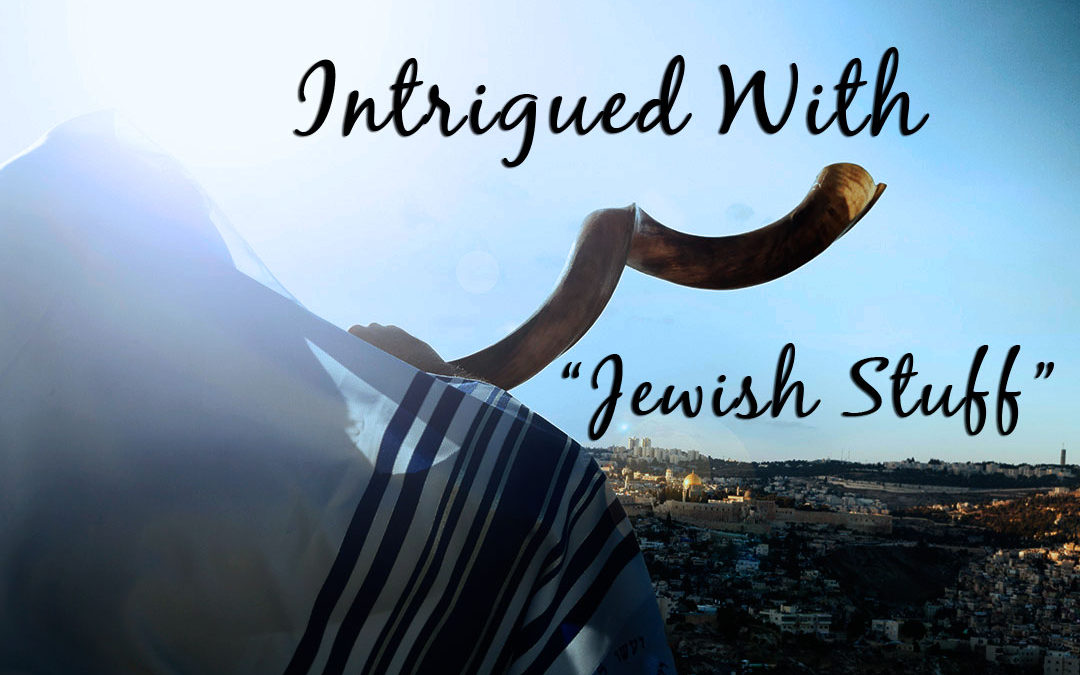People often times question me regarding my interest in all things considered “Jewish”. Well, first, I stand with Israel. I am quick to crush anything anti-Semitic or distance myself from anything anti-Semitic. Israel, and the people of Israel, are still God’s chosen.
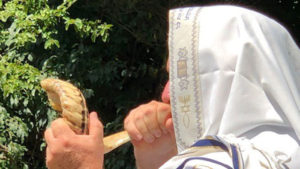 Secondly, I have studied and done research long enough to see that God is still operating on The Sacred Calendar or the lunar calendar. The Feasts in the Bible are often times referred to as “Jewish” holidays. Maybe they are. However, Leviticus 23:2 states, “Speak to the sons of Israel and say to them, ‘The LORD’s appointed times which you shall proclaim as holy convocation—My appointed times are these;’”
Secondly, I have studied and done research long enough to see that God is still operating on The Sacred Calendar or the lunar calendar. The Feasts in the Bible are often times referred to as “Jewish” holidays. Maybe they are. However, Leviticus 23:2 states, “Speak to the sons of Israel and say to them, ‘The LORD’s appointed times which you shall proclaim as holy convocation—My appointed times are these;’”
Leviticus 23:4 states, “These are the appointed times of the LORD, holy convocations which you shall proclaim at the times appointed for them.” Thereafter, the appointed times for the feasts are presented as to when they are. The point that I’m getting to is that the feasts are GOD’S APPOINTED TIMES. Certainly, there are Jewish holidays that the Jews celebrate. However, I reiterate, the Feasts are God’s Appointed Times. These times are: Passover, with the Feast of Unleavened Bread. On the fourteenth day of the first month (Nisan) is the Lord’s Passover. On the fifteenth day, the day after, begins the Feast of Unleavened Bread which continues for seven days. Of course it is necessary to know that a “day” begins at sundown prior to the morning light. Instead of sun up to sun up being a day, as we are accustomed, a “day” is from sun down to sun down. This was established in Genesis 1:5. Go ahead. Look it up.
Fifty days later is Shuvout. It is when God gave the Law to Moses and the people at Mount Sanai. It is also the day of Pentecost. It is the day that Holy Spirit arrived. Funny how things line up in the Sacred Calendar, isn’t it? God gives the Law and then God gives us Holy Spirit on the same calendar date!
Then, the first day of the seventh month (Tishri), is Rosh Hoshana. The beginning of the new year, which is odd that the New Year begins at the beginning of the seventh month. However, it is according to the SEASONS that determines the new year. At that time, you have the Feast of Trumpets followed by the Feast of Tabernacles (The Full Moon opens the Feast of Tabernacles). The last day of Feast of Tabernacles Hoshana Rabbah. It is the day of great joy for the Jews. They dance with the Torah. In Christianity, it is believed that this will ultimately be the day of Judgement. Shimini Atzeret, is the eighth day of gathering. It is believed to be the day that Christ was circumcised.
ALL of that is in God’s sacred, lunar, calendar. Which brings us to the trumpets. The trumpets are sounded at the New Moon which ends the current month and ushers in the new month. Why is that important. It is proclaiming God’s sovereignty over the prior month and the new month. The Trumpets are sounded on the Full Moon of the Feasts. Passover, Pentecost, and the Feast of Tabernacles begin on Full Moons. Why is that important? It is a proclaiming of God’s sovereignty of the closing SEASON and the new, opening of another SEASON! The sounding of Trumpets is for people to remember the great miracles of God and, in some instances, God’s delay for disobedience. The wandering of the nation of Israel for forty years in the wilderness comes to mind.
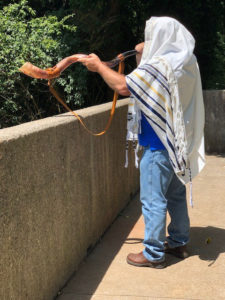 Prior to the month of Tishri is the month of Elul. The trumpets are sounded extensively every day of this month. The purpose of the soundings is to awaken people from a spiritual slumber or apathy. It is to call people to repentance, self-evaluation, and to prepare themselves for “the High Holy Days” that are coming in Tishri.
Prior to the month of Tishri is the month of Elul. The trumpets are sounded extensively every day of this month. The purpose of the soundings is to awaken people from a spiritual slumber or apathy. It is to call people to repentance, self-evaluation, and to prepare themselves for “the High Holy Days” that are coming in Tishri.
I repeat the question that I’ve been asked so many times. Why are you so hung up on all this “Jewish Stuff”? Let me think about that for a moment………
Okay, Jesus was a Jew. Peter, John and the disciples were Jews. The apostle Paul, who wrote half of the New Testament, was a Jew. Those one hundred and twenty people in the Upper Room, they were Jews. The three thousand at Pentecost, when Holy Spirit arrived, they were Jews. They ALL wore the tallit and they ALL observed the Feasts, the appointed times of God. Jesus observed the Feasts. Paul observed the Feasts, and wore a tallit, long after Christ had ascended and long after the arrival of Holy Spirit. Oh my goodness! The church, in its infancy, was Jewish! What changed?
Jesus changed. What did he change? Jesus changed the way righteousness was obtained. Righteousness is an ancient legal term. It means “to be put in right standing before a judge.” We no longer offer burnt offerings for the forgiveness of sins. Jesus died, one time, for the forgiveness of sins and He died in our rightful place. That’s not all He accomplished on the cross but for the sake of this conversation, I’ll leave it at that.
Now, let me talk a few moments about the tallit, or the prayer shawl. The tallit is mentioned in the Book of Numbers 15:38 telling Israel to put tassels on their “garments”. The “garment” was a rectangular garment to cover themselves with in prayer and meeting with God. Two million Jews could not fit under the tabernacle so God designed and instructed the garment to be made to serve as a “little tent” for each individual. The tassel was a reminder of the Laws of God. The tassel is called “tzit-zit” and there is a tassel on each corner of the garment. In the four tassels there are 613 knots for the 613 laws of the Torah which is also called the Pentateuch, The Books of Law, and the Books of Moses. Basically, the first five Books of the Old Testament.
The tallit is nothing magical, mystical, or metaphysical. It is merely a piece of cloth. The tzit-zit, on each corner, as mentioned earlier, have a combined total of 613 knots. Between each of those series of knots are windings of a thread around all the other threads. Between each series of knots was a specific number of windings around all the other threads before the winding thread is combined into the next series of knots. This specific number (of windings) is attributed to a specific letter in the Hebrew alphabet. The numbers of windings in each tzit-zit actually spells “Yhwh” or the proper Name of God the Father. In essence, the tassels, or tzit-zit, serve as tent stakes for the tallit. It is why one should not allow the tallit or the tzit-zit to touch or drag on the floor or the ground. It would be comparable to dragging God’s name in the dirt!
Let’s consider the woman with an issue of blood in Mark 5:28 and Luke 8:43. She knew if she could touch the hem of Jesus’ garment that she would be healed.
Luke 8:44 (NASB95)
44 came up behind Him and touched the fringe of His cloak, and immediately her hemorrhage stopped.
In this text notice the words “fringe” and “cloak”. These two words indicate an “outer garment”. The outermost garment would have been Jesus’ tallit. Remember, Jesus was a Jew and He did wear a tallit. There is no power in the tallit itself. It is with the one with whom you meet under neath the tallit who holds the power. It is in the act of obedience that the power is manifested.
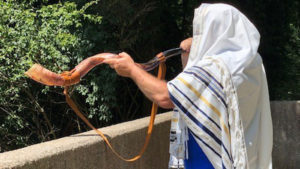 Now that we have that out of the way, let’s go back to Jesus. Jesus’ death, burial, and resurrection was what sealed our redemption so that we could be made righteous. No longer are we required by Law to follow the Law for the sake of salvation or redemption. However, we need to investigate to determine if anything else changed.
Now that we have that out of the way, let’s go back to Jesus. Jesus’ death, burial, and resurrection was what sealed our redemption so that we could be made righteous. No longer are we required by Law to follow the Law for the sake of salvation or redemption. However, we need to investigate to determine if anything else changed.
The ordinances of Communion and Baptism were brought into play. The burnt offerings cease because, as mentioned earlier, Jesus was the sacrifice. There is no need to make burnt offerings, peace offerings, drink offerings, and grain offerings. Jesus’ blood covers those offerings. Having said that, there is the matter of offerings in prayer that are still in effect as well as are the tithe and gifts of giving. These offerings are offerings of thanksgiving to the Lord for His provisions, grace, and mercies. Why do we offer thanks before meals? What are our motives for praying? Is it merely for God to bless us with “stuff”? May it never be! Be certain that blessings are a result of prayer and petition. Prayers are not merely performed to meet our needs. God knows our needs. Prayer has a greater meaning. In prayer, we delight ourselves in the LORD and He gives us the desires of our heart. The problem is in the desires of our hearts.
In the Book of James 4:2-3 it reads: (NASB ’97 Emphasis is my own)
2. You lust and do not have; so you commit murder. You are envious and cannot obtain; so you fight and quarrel. You do not have because you do not ask.
Now that second part of verse 2, that I wrote in bold letters, is part of the verse that so many people like to pick out and harp on, claiming the “desires” of their heart. Far too few want to continue reading to get the whole of the revelation.
3. You ask and do not receive, because you ask with wrong motives, so that you may spend it on your pleasures.
Now that you see that, are we really delighting ourselves in the LORD when we pray?
Nowhere have I seen, or read, that the sounding of the shofar, wearing the tallit, or observing the Feasts have been commanded to cease. The Apostle Paul observed the Feasts and wore a tallit, as I said earlier, long after Jesus ascended and after Holy Spirit was ushered in. What? Paul didn’t sound the shofar? Well, perhaps not. But I’ll bet my last gold monkey that he knew the sound of the shofar! Why? Because he continued observing that which God had instituted apart from the means of which righteousness was obtained. Part of Jewish teaching is that every man “hear” the sound of the shofar. Why? Because it is like the voice of God.
So, you may be asking, “Why does the church not recognize these things today?” I am so glad you asked that question.
 Let’s go back to 57 A.D. in time. The Jews had been exiled out of Rome because they had been arguing with the gentile members of the church about the “Christus” or Christ. Even then, there was disunity and bickering in the church. At the time Paul was in the Greek city of Corinth and wrote the letter to establish doctrine, promote unity in the church, and how to apply what he was teaching as the Jews were filtering back into Rome and, still, there was dissension.
Let’s go back to 57 A.D. in time. The Jews had been exiled out of Rome because they had been arguing with the gentile members of the church about the “Christus” or Christ. Even then, there was disunity and bickering in the church. At the time Paul was in the Greek city of Corinth and wrote the letter to establish doctrine, promote unity in the church, and how to apply what he was teaching as the Jews were filtering back into Rome and, still, there was dissension.
In 70 A.D. Rome destroyed Jerusalem and the church exploded outwardly. There was both Jew and Gentile in the church, but as the church grew it became increasingly Gentile. The Jews were being persecuted to an unimaginable extent. So were Christians. However, even Christians persecuted Jews. Christians would persecute Christians! Sounding familiar? But the Jews were persecuted to the greater extent and Christians sought to distance themselves from the Jews and anything with “Jewish” ties. Therefore, the shofar, the tallit, and the observing of the Feasts were phased out. For the longest time, even Jews could not sound the shofar in Jerusalem! The Jews were scattered throughout the earth. For almost 1800 years they were scattered before Israel became a nation again.
Then, in 325 A.D., the Roman Emperor, Constantine, called the Council of Nicea to address Arianism which disputed the personage of Christ. The result was the Nicean Creed. However, when Constantine called the Council, there was a great amount of dissension and anti-semitism in the East where the Council was called. There were no, or none that I can find, Jewish/Hebraic believers present at the Council. In no way did the Council want the church to appear “Jewish” in any shape, form, or fashion. In spite of the fact of the deep Jewish roots that predominantly made up the initial church, all aspects of anything perceived as “Jewish” disappeared from the church as we know it.
Why am I so hung up on all this “Jewish stuff”? Well, I don’t see it as “Jewish stuff”. I see it as that which God instituted. The church was birthed with Jews who were well established in the things instituted by God. Messianic Jews continued to practice much of what was instituted by God. They understood that salvation and righteousness was obtained through Jesus. However, they also understood that some aspects of their beliefs attributed to God’s Word had not ceased.
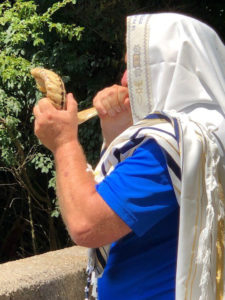 Am I a Messianic Jew? No. Do I love the Messianic Jew? You bet. Do I love Jews? Yep! Do I stand with Israel? Don’t ever doubt it. Do I plan on converting to Judaism? Not even remotely. Do I think that the shofar, the tallit, and observing the Feasts are still important? Yes, I do. Do I observe all these things in strictest form? Probably not. There is much to learn to be “legal” in the aspects of being “legal”. Jesus is enough.
Am I a Messianic Jew? No. Do I love the Messianic Jew? You bet. Do I love Jews? Yep! Do I stand with Israel? Don’t ever doubt it. Do I plan on converting to Judaism? Not even remotely. Do I think that the shofar, the tallit, and observing the Feasts are still important? Yes, I do. Do I observe all these things in strictest form? Probably not. There is much to learn to be “legal” in the aspects of being “legal”. Jesus is enough.
However, there are a few things that should be considered. I am a gentile. I am not Jewish.
Romans 11:16-21 (NASB ’95 emphasis is my own)
16. If the first piece of dough is holy, the lump is also; and if the root is holy, the branches are too.
17. But if some of the branches were broken off, and you, being a wild olive, were grafted in among them and became partaker with them of the rich root of the olive tree,
18. do not be arrogant toward the branches; but if you are arrogant, remember that it is not you who supports the root, but the root supports you.
19. You will say then, “Branches were broken off so that I might be grafted in.”
20. Quite right, they were broken off for their unbelief, but you stand by your faith. Do not be conceited, but fear;
21. for if God did not spare the natural branches, He will not spare you either.
It is this passage that gives me hope. It is this passage that propels me to consider that which is considered by others as “Jewish”. The church is deeply rooted in a Jewish foundation. It is a foundation that, I believe, has not disintegrated.
I walk the ancient paths, observing the Feasts, wearing my tallit, and sounding my shofar according the instructions I have found on these ancient paths. Those paths lead to Jesus. I want to be more like Jesus.
I am The Old Watchman. Now you know.

